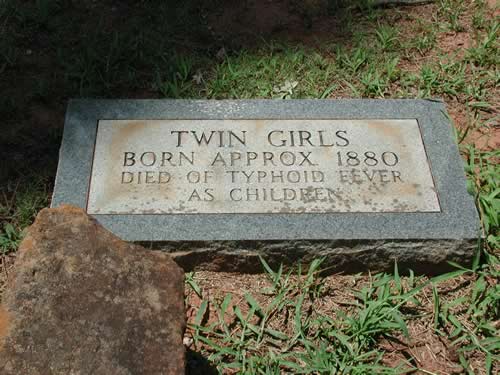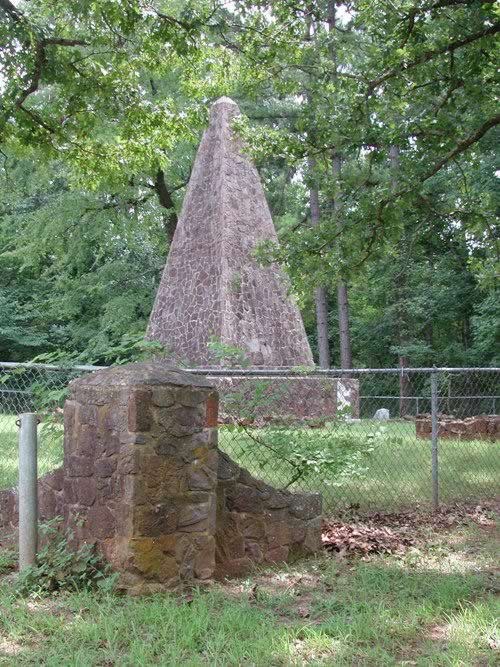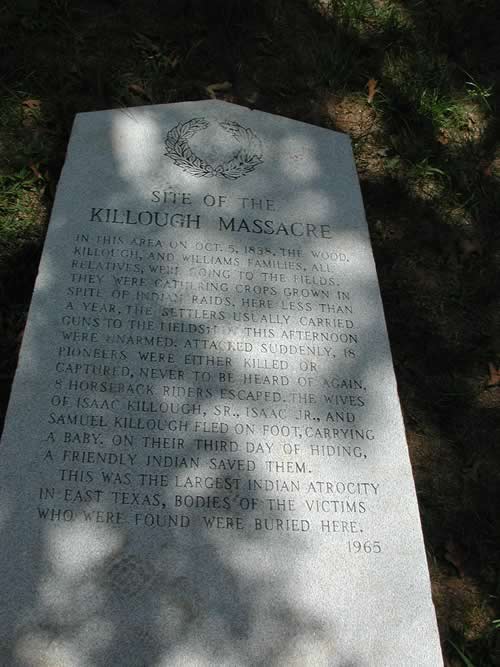The Killough Massacre. (original) (raw)
Text & photos by Janet Gregg
‹ Previous page Ultimately, most of the survivors returned to the settlement. Nathaniel, Eliza and baby Eliza Jane ended up repairing and living in one of the houses that had been torched. Reports vary between it being Samuel�s, Allen�s or his own home.
Narcissus Killough, Samuel�s widow, remained in Alabama for 13 years before returning to the area. But she did eventually come back to settle in Larissa in 1851 with son William Boykin Killough.
Jane Killough, Isaac, Jr.�s widow, returned to her own home.
It is said that one of George and Jane Wood�s sons was adopted by the Indians and grew up to become their chief.
The Killough Massacre Monument and stone cornerpost.
Photo courtesy Janet Gregg, 2005
The massacre was the largest single Indian massacre in East Texas and also the last. It led to the expulsion of the entire Cherokee Indian Nation from Texas.Approximately 100 years later, during the Great Depression, a stone obelisk was erected by the Work Projects Administration to mark the site. In 1965 a state historical marker was dedicated there.
Site of The Killough Massacre historical marker
Photo courtesy Janet Gregg, 2005
In 1955, descendents tracked down the site again, which had been left untended and was overgrown. They formed The Killough Reunion Association two years later. The company which owned the land gave the burial site to the Association �in perpetuity� as long as it is maintained properly. Today, the site is fenced and descendents hold reunions and cleanups every other year.
The best time to visit the site is in the winter, when the leaves have fallen from the trees. Then you can look through their limbs to the little valley below. You can almost envision the settlers, their daily life there and even the massacre unfolding. But it�s also a tranquil site, which gives the visitor a sense of comfort that the victims of the atrocity are truly at peace.

Later interments
Photo courtesy Janet Gregg, 2005
Text and photos � Janet Gregg
November 8, 2005Writer�s Note: As with many stories handed down verbally from generation to generation, there are some discrepancies between the various versions that have been put into writing. I have taken all available information into account and tried to clarify and resolve those discrepancies, choosing the most likely scenarios for this article when a concrete resolution to a specific detail could not be found. - JG
Resources:
- Jean Cannon � Tyler, Texas � descendant of Nathaniel Killough.
- �The Killough Massacre� book by Jack Moore.
- Killough Reunion Association web site, including posted articles: �Ferd L. William�s Story�, �Texas� Last Indian Massacre�, �Uncle Billie�s Story� and ��Who Is Buried There?�
- Handbook of Texas Online � posted articles including information on Nacogdoches, Lacy�s Fort, Killough Massacre and land prices.
- Tomatocapital.com web site posted article on Killough Massacre by Virginia Davenport.
Texas Escapes, in its purpose to preserve historic, endangered and vanishing Texas, asks that anyone wishing to share their local history, stories, landmarks and recent or vintage photos, please contact us.

